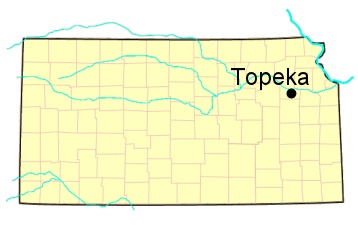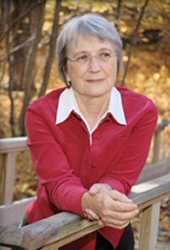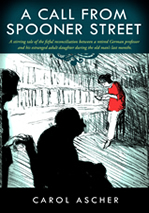
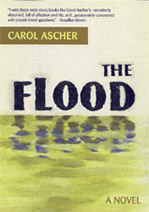
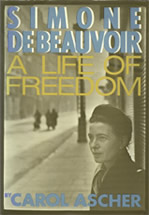
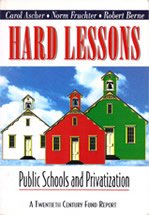
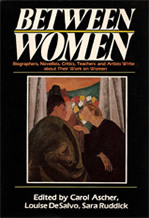
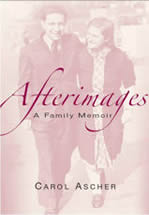
|
| Biography |
|
| |
Carol Ascher‘s writings span memoirs, fiction, personal essays, scholarly articles and book reviews. Her works, both fiction and non-fiction, often examine themes of intolerance and inequality. She has been published widely accross the United States, and has won numerous awards including, four PEN/National Endowment for the Arts Syndicated Short Fiction Awards, two awards from the New York Foundation for the Arts, a Thomas Carter award for literary nonfiction, and a fellowship from the Memorial Foundation for Jewish Culture.
Born in 1941, Carol grew up in Topeka, Kansas, where her father was a psychoanalyst at the Menninger Sanitarium. She attended Vassar College and earned a degree in Anthropology and religious studies from Barnard College in 1963 and a PhD. in Anthropology and Education from Columbia University in 1974.
Visit Carol Ascher's personal web-site.
Visit Carol's Facebook page.
Return to Top of Page |
|
|
Bibliography ( - housed in Thomas Fox Averill Kansas Studies Collection) - housed in Thomas Fox Averill Kansas Studies Collection) |
|
| |
Novels:
Scholarship:
Return to Top of Page |
|
|
| Writing Samples |
|
| |
"On Becoming Carol Ascher" (essay)
"Der Rechte Weg" (Chapter two from Afterimages PDF)
"Cooking" (essay)
"Lucia" (essay)
It was the black starry June night we had been waiting for. Each evening since spring began we had looked out at the sky as the dusk fell, but either rain clouds had hung low and disturbing, or Mother had judged the ground too damp. But now, after a short drive out of Topeka in search of an empty pasture, the sky spanned high above us, filled to overflowing with stars.
“How far away is it?” I whispered. I was as I used to say that summer, nine going on ten, and I often liked best those questions which I suspected had a very difficult answer.
“Which one dearie?”
Father’s voice was distant, as if he had moved off to join one of the stars. I didn’t clarify myself. I wasn’t in the mood tonight for one of Father’s long explanations, part philosophy, part fact or science. Watching the black sky vibrating with stars high above me, what I might have wanted were words to release the longing the night breeze had blown over my breast.
We lay on a woolen blanket, the four of us: me, Father, Mother, and Sarah, who in the fall would be seven. Sarah lay beyond Mother, on the other side of Father, but I could imagine her body curled up in the crook of Mother’s arm.
---Excerpt from The Flood
Return to Top of Page
|
|
|
Photos
|
|
|
| |
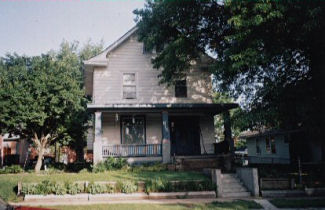
Carol's childhood home in Topeka
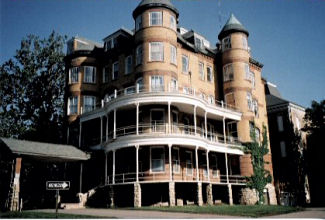
An old Kansas State Hospital building
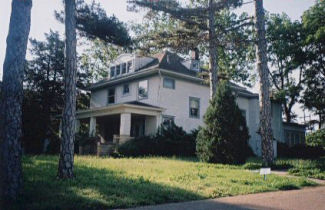
The old Menninger building

Carol Ascher in 2004 across the street from her childhood home
Return to Top of Page |
| Book Reviews |
|
| |
The Flood
Ascher
(Simone de Beauvoir) movingly depicts the ravages of prejudice as witnessed by a
nine-year-old Jewish girl in Kansas during the 1950s. Eva Hoffman, her younger
sister, Sarah, and their parents, David and Leah, enjoy an upper-middle-class,
cultured lifestyle until events disrupt their tranquility. Ground-breaking civil
rights legislation (Brown v. the Board of Education) raises the issue of
mandatory school integration, a situation closely watched by the Hoffmans' black
cleaning woman, Mrs. Johnson. Knowing that her parents had to flee Vienna in the
'30s, Eva has a special sensitivity to racial injustice. A neighbor's emphatic
refusal to adopt a black child also fuels Eva's outrage, but the catalytic
incident occurs when the family of a railroad worker stays with the Hoffmans
after a flood leaves them homeless. Eva and her parents soon detect the guests'
bigotry, and their rising moral indignation threatens to outweigh any sympathy
they feel for these refugees. The destructiveness and communicability of racism
are cogently demonstrated, yet Eva's precocity strains credibility, and the
novel's abrupt conclusion may leave readers dissatisfied.
Copyright 1987 Reed
Business Information, Inc. --This text refers to an out of print or unavailable
edition of this title.
---Content From Publishers Weekly
A disastrous spring flood
and the coming of integration introduce adult problems into the placid life of a
young Kansas girl. At ten, Eva Hoffman has had a textbook-perfect childhood
despite her German-Jewish parents' memories of Nazi horrors. Now, as Brown
brings suit against the Topeka, Kansas, school district she attends, and floods
bring confrontation with refugees whose lives differ widely from hers, Eva must
learn to accommodate both the world's ugliness and the altruistic values she has
been taught. Ascher writes lucidly and simply about complicated situations and
feelings, so much so that the novel might do for a literate young adult reader,
though oversimplification of character and a weak ending somewhat mar its
impact. Recommended. Shelley Cox, Special Collections, Southern Illinois Univ.
Lib., Carbondale
Copyright 1987 Reed Business Information, Inc. --This text
refers to an out of print or unavailable edition of this title.
---Content From Library Journal
"A richly evocative story of the awakening to
adulthood."
---Los
Angeles Times
"A refreshing and extremely moving
novel."
---Ms. Magazine
"Eva is...reminiscent of a Carson McCuller's
heroine."
---New York Times
“The Flood creates a rich conjunction of diverse characters, of
large events and issues, all explored with admirable modesty”
---Jonathon
Strong, author of Elsewhere
“An enthralling, beautiful and morally serious
novel. The quietly accurate evocation of family electricity is reminiscent of
Virginia Woolf’s To The Lighthouse. The portrait of the mother alone would make
The Flood worth reading.”
---Sally Ruddick, author of Working It Out
“The
Flood is a lovely book, a truly stirring account of the end of childhood, the
beginning of political consciousness.”
---Hilma Woltzer, author of In The
Palomar Arms
“I wish there were more books like Carol Ascher’s-sensitively
observed, full of affection and life, and (so rare these days) passionately
concerned with crucial moral questions. In The Flood a child learns which are
the questions that matter and which ones cannot be answered except by making a
courageous statement of one’s own.”
---Rosellen Brown, author of Civil Wars
Afterimages
Pursuing her story across two continents, from the Midwest of her own childhood to the Europe of her parents' growing up, Carol Ascher, the daughter of a Viennese psychoanalyst, explores with much psychological insight the unsettling legacy of Nazi persecution on her complicated immigrant family, and ultimately on herself, in this probing, well-written memoir.
---Alix Kates Shulman, author of Memoir of a Prom Queen
A moving, compelling, and beautifully written family memoir, Afterimages sheds new and important light on refugee displacement, emigration, and the continuing legacy of the Holocaust for those who come after the event but continue to live in its unending shadow. Carol Ascher, American-born daughter of parents who fled Nazi anti-Semitism from Germany and Austria, takes us along on her fascinating quest to unravel the complex strands of a her family’s – especially her father’s – complicated background history in Europe before the war, and the powerful "afterimage" of that history as it affected her and her siblings throughout their lives in the United States. In so doing, and in enmeshing the familial with her own, personal, account of increasing understanding and compassion, she provides us with a poignant book, a second-generation chronicle that offers rich intellectual insights while also stirring our deepest feelings.
---Leo Spitzer Vernon Professor of History Emeritus, Dartmouth College, Author of Hotel Bolivia
Return to Top of Page |
|
|
| Interview |
| |
Interview conducted by Chelsea Hochstetler via e-mail on April 29 2008 and phone on May 5, 2008
Q. What inspired you to begin writing?
A. I have kept a journal since I was a child--it was a way to talk to myself and to keep track of my thoughts. I must also have discovered quite early that writing made me peaceful, and that I discovered what I was thinking through writing.
Q. How do you think that growing up in Kansas may have influenced you, and your writing?
A. Although I left when I was twelve, hilly Eastern Kansas is still the landscape that I recognize most deeply inside me. On the other hand, because I was the daughter of Jewish refugees from Nazi Europe, and my classmates and neighbors were Christians whose families were native-born, Kansas also gave me my sense of being an outsider.
Q. How long did you live in Kansas?
A. Until I was twelve.
Q. Who are some of the authors/poets that you most admire?
A. There are a number of American novelists whom I admire, and I tend to read mostly women. I like woman writers because what they can do I can do. Among my favorites are: Edith Wharton, Willa Cather, Mary Lee Settle, Joan Dideon. Also British women, from Jane Austen, the Bronte sisters and George Eliot to Margret Drabble, Doris Lessing and Pat Barker.
I have also been greatly influenced by Russian and German authors. They paint an absolute whole world, and each character is so richly rendered. It is to me the consummate novel. Right now I'm giving myself a course in German literature, and am reading Thomas Mann.
Q. Is there anyone who has inspired you to write?
A. My father had a friend, who after seeing some of my poems at age eight or nine, gave me a book of American poems. That was a tremendous affirmation of my ability to write.
Q. When did you first take yourself seriously as a writer?
A. When I was 35, I decided that I would focus my life on writing, and whatever I did for money would be on the periphery. However, when I was 50, circumstances forced me to work full-time for the next fifteen years. This was as a researcher, studying public schools--a job in which I did a lot of academic and scholarly writing. Nevertheless, I knew that when I had the chance I would again write my own things full-time.
Q. I know that you have done a wide variety of writing, what kind of writing do you enjoy the most and/or hope to do more of in the future?
A. I enjoy most, and feel best about myself and my creativity, when I am writing either fiction or memoir--writing that comes from a deep place inside me.
Q. How long did it take for you to write The Flood?
A. I'm no longer sure. I think several years. What I do know is that when the book was going to be published for the second time (by Curbstone Press), I spent several months rewriting it. The version that was issued by Curbstone in 1996 differs in small respects all the way through from the earlier version issued by Crossing Press in 1987.
Q. What do you think separates a good book from a great book?
A. A great book creates a whole world--political, social, moral, psychological. Its characters have depth and complexity. Something is said that reaches far beyond entertainment. A great book becomes an experience in one's life, no less than something one has gone through directly.
Q. What kind of things do you do for the Annenberg Institute?
A. I conduct research on urban public schools. Most recently, I studied small urban high schools that were successful in educating kids who enter with fairly low skills, as well as problems the State of New York has had tracking and serving homeless students. In my research, I tend to study those students who haven't had a fair break, and I'm always concerned with issues of equality, and prejudice.
Q. What do you hope that people might learn from your writing?
A. I don’t know. I’m not sure that I write in that way. I want them to be moved, perhaps to understand me and what I write about, and to better understand the nature of prejudice and inequality.
Q. Do you have any new books in the works?
A. I’m writing a new novel which is so far called Winter. It is about a father and daughter who have been estranged for many years and who in the twilight of his life find ways to understand each other.
Return to Top of Page |
|
|

